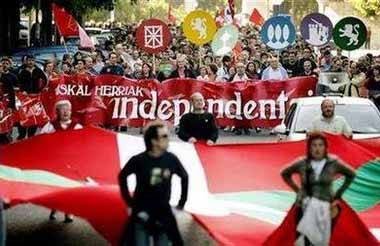22.09.2008
September 19, 2008 (the date of publication in Russian)
Ruslan Kostyuk
SPAIN: THE PERIOD OF CALM IS OVER
The Basque Country's authorities insist on a referendum on independence
 The government of Spain that earlier recognized the independence of Montenegro and admitted, though reluctantly, the fact of Kosovo's secession, nervously reacted to the decision of Moscow to recognize independence of Abkhazia and South Ossetia – also not immediately but after it became clear that NATO is not going to undertake a joint military operation for re-establishing integrity of the crumbling Georgia. On September 12, the Constitutional Court of Spain cancelled the Law on Public Inquiries, earlier adopted by the parliament of the Basque Country. The powers of the autonomous community were going to raise two issues before the population: namely, whether the political forces should consolidate to conduct a referendum of the Basque Country's independence by late 2010, and whether the autonomy's government should negotiate with the radical pro-secessionist movement of ETA in case it refrains from violence. The inquiry, initiated by the Basque Country's Prime Minister Juan Jose Ibarretxe, had been scheduled for October 25. After the Constitutional Court made it legally impossible, the chair of the autonomy's government promised to address the European Human Rights Court, and urged the population to file individual legal suits.
The government of Spain that earlier recognized the independence of Montenegro and admitted, though reluctantly, the fact of Kosovo's secession, nervously reacted to the decision of Moscow to recognize independence of Abkhazia and South Ossetia – also not immediately but after it became clear that NATO is not going to undertake a joint military operation for re-establishing integrity of the crumbling Georgia. On September 12, the Constitutional Court of Spain cancelled the Law on Public Inquiries, earlier adopted by the parliament of the Basque Country. The powers of the autonomous community were going to raise two issues before the population: namely, whether the political forces should consolidate to conduct a referendum of the Basque Country's independence by late 2010, and whether the autonomy's government should negotiate with the radical pro-secessionist movement of ETA in case it refrains from violence. The inquiry, initiated by the Basque Country's Prime Minister Juan Jose Ibarretxe, had been scheduled for October 25. After the Constitutional Court made it legally impossible, the chair of the autonomy's government promised to address the European Human Rights Court, and urged the population to file individual legal suits.
In its turn, the Supreme Court of Spain ruled to ban the Basque Nationalist Action Party (ANV), the fourth largest political force of the autonomy. The next expected target of the federal court is the Communist Party of Basque Homelands (PCTV). These police measures are likely to spark new radicalization, as the political vacuum is going to be filled with underground terrorist activities.
The upsurge of secessionism in the Basque Country is taking place on the background of an overall deterioration of the economic situation in Spain. The global financial crisis has severely affected the country in summer 2008. The third quarter of the year displayed a zero index of economic growth and a decline of the amounts of both production and consumption. Meanwhile, inflation rose by 5% during the three summer months, while unemployment reached 11% of the labor force.
Federal officials interpret the latest problems of Spanish economy exceptionally with external factors. Prime Minister Juan Rodriguez Zapatero refers to the international credit crunch. His political partner, Economy Minister Pedro Solbez, argues that Spain "is doing its best to relieve the implications of the crisis".
The government promised to allocate 20 billion Euro for the so-called economic package in 2009-2010. The reform suggests an increase of public investments in infrastructure, transport and services, as well as measures of social protection. At the same time, however, the Government is going to continue its policy of tax reduction, hoping thus to revitalize domestic industries.
This aspect the reform is most ambiguous. The federal government is going not only to introduce a monthly revision of the value-added tax, but also to cancel the so-called wealth tax. According to experts, this measure, benefiting 1.3 million of well-to-do citizens, will cut revenues by 1.8 billion and increase social polarization, though the gap between the richest 10% and the poorest 20% already comprises a proportion of 1:17.
It is true that the tax burden on Spanish industries and services is rather substantial, reaching 41% of the GDP. However, Spain is only the 15th country in the EU in the amount of taxing, falling behind the Scandinavian countries, the Netherlands and France.
The social-liberal policy of Zapatero's government was supported by the population while it was satisfied with the rate of economic growth. However, today's effects of the economic crisis are undermining the popularity of the government and the ruling Spanish Socialist Workers' Party (PSOE). Naturally, the rivaling Popular Party (PP) is gaining weight, on the background of disappointment of the trade unions with the policy of federal authorities. Some trade union associations (Labor Commissions) are going to launch strikes.
The economic decline will inevitably affect the political situation in the Basque Country which the federal Government is trying to manage by administrative methods. That means that in the nearest time, Spain's state integrity may be put under question.
Number of shows: 1016
 ENG
ENG 

 ENG
ENG 
